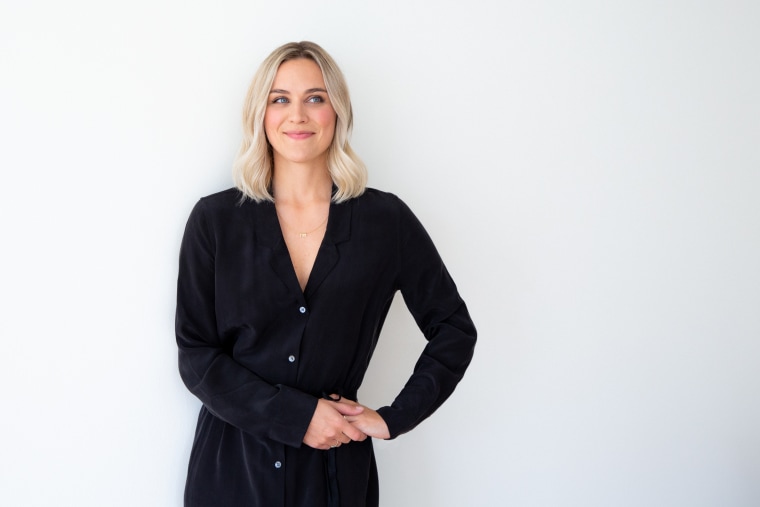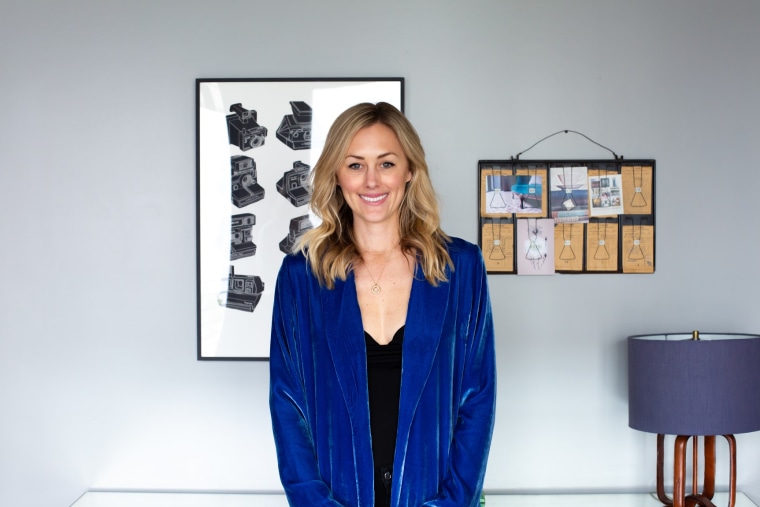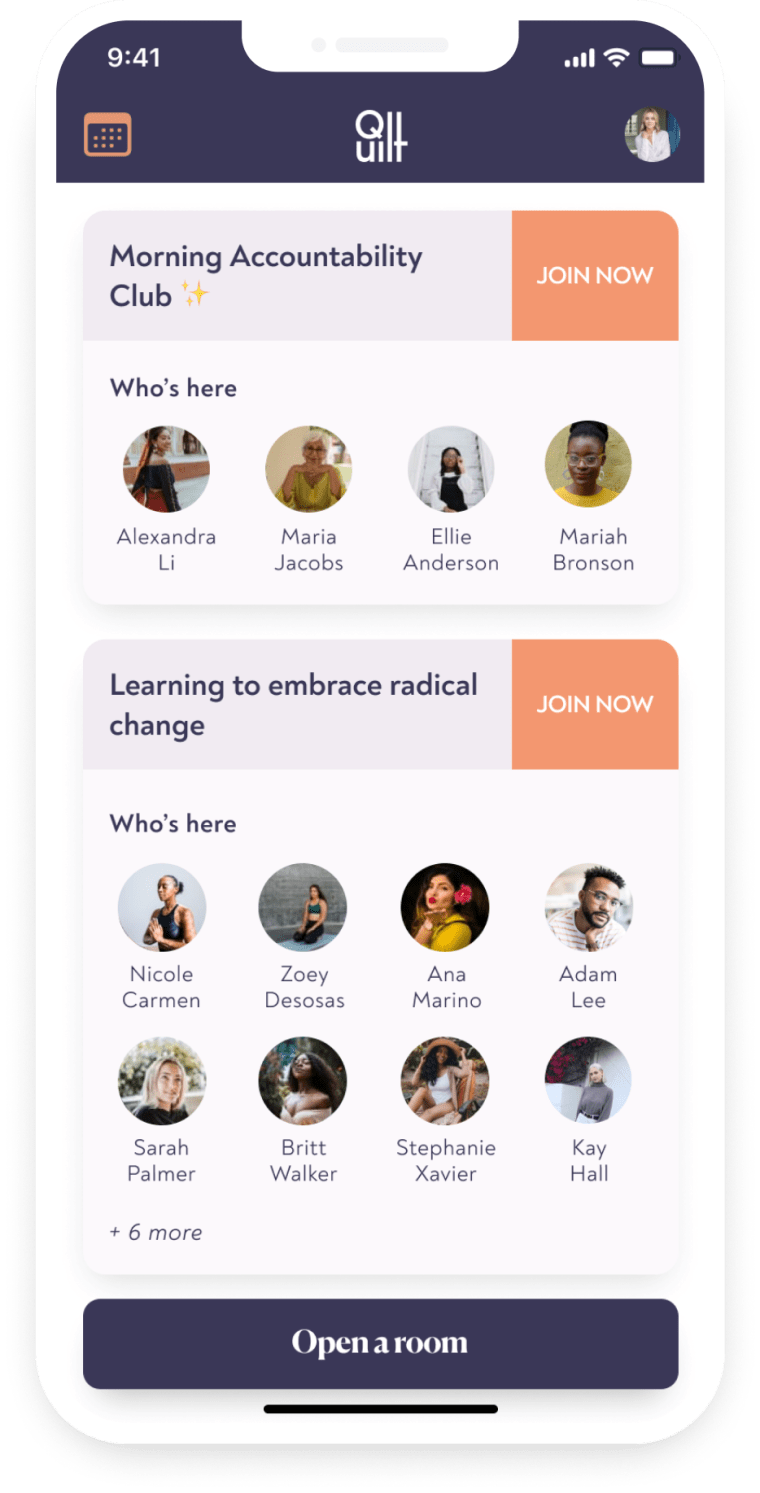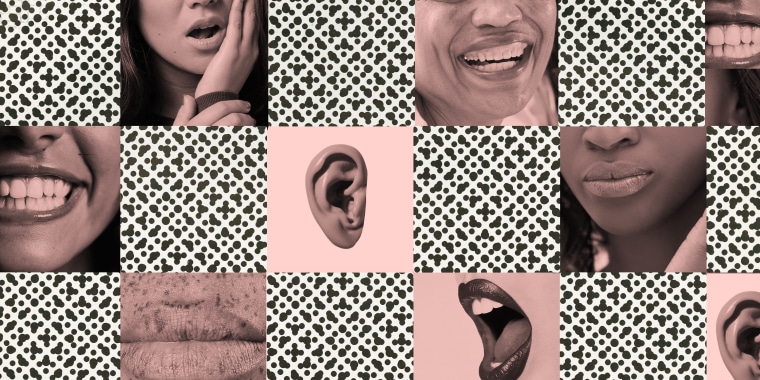Warm, nostalgic and soothing are not words typically associated with social media. However, Ashley Sumner wants to change that with the app Quilt, a real-time audio network “where conversation is self-care.”
While some may dub it as another Clubhouse, the invitation-only social networking app with audio chat rooms, Quilt is driven by a feminine but gender-inclusive social media experience that seeks to restore human connection. No invitation or fee is required.
Before the 32-year-old CEO launched the application and prior to the COVID-19 pandemic, Quilt 1.0 fostered community as a physical co-working space at various homes across California. Sumner said the name came from the notion of a group of women gathered together inside a house, scribbling on Post-it notes, brainstorming and eating. The second the word “quilt” was shared, the Pennsylvania native hearkened back to her roots and history.
A 2014 study that found that men are 33% more likely to interrupt a woman in conversation than another man.
“The quilting circle was primarily women coming together and...what was shared sitting there and stitching was their experiences, trading tips, talking through different things,” Sumner told TODAY via Zoom. “Our conversations have this similar type of structure that's also being used, but it was also thinking through how women can come together and create this thing that's greater than themselves — that can take care of both themselves and the people that they care about.”

Building community experiences
The company was formed in 2016 by Sumner and Gianna Wurzl, the former co-CEO, and the first quilt event was hosted in September 2017. Similar to an Airbnb format, quilters could list their homes on the site and title the conversation however they saw fit. Back then, in order to get the address and participate on the community level, users paid a $19 membership fee.
Wurzl, 35, said that homes were chosen because of the respect the space demands; community members tend to be not only respectful of property but also less conscious of themselves and can let their guard down.
“You're seeing all these co-working spaces, like WeWork, then smaller ones pop up. Nothing was really being reimagined and coming from a more feminine perspective," Wurzl told TODAY via phone. "The spaces that we gather in, work in and create in matter. Oftentimes, we lose sight of that. The home already elicits such a feeling of comfort and trust and safety."

Sumner and Wurzl wanted to empower other women to open up their personal spaces to create conversations surrounding what is meaningful to them — and Quilt 2.0 took the mission to a digital, global scale. Sumner shifted the format upon realizing that the work she previously partook in did not engage technology, nor did it have an inclusive audience.
“I started having my own kind of existential crisis that I'd spent at that point, a decade building community, really, for the top 1%-10%. The amount of privilege that's inherent to access these amazing experiences...I wanted to make those experiences more accessible across neighborhoods, local communities, regardless of where you were,” Sumner said.
Raising capital, raising the bar
With the help of Mayfield Fund partner Rishi Garg, Quilt raised over $3.5 million in seed funding and launched the beta app last August. In February 2020, Wurzl left the company on her own accord, but she still uses the application.
Competitor Clubhouse, launched in April 2020 by two male founders, Paul Davidson and Rohan Seth, has been widely popularized by Black creatives and consumers; the app was recently valued at $1 billion. According to Harvard Business Review, women-led startups received only 2.3% of venture capital funding in 2020. A survey from ProjectDiane, a research initiative led by Didtechnology, Inc. to gather data on Black women in tech entrepreneurship, found that between 2018 and 2019, “Black and Latina women combined received just 0.64% of total venture capital investment.”
Sumner continued, “I am a woman and I have not felt safe or included in the majority of the social spaces I have found myself in up until this point. I wanted to create a community I could belong in, that I could have a voice in, that I feel like I can show up to. I know that for other women — nonbinary, people of color, disabled — this is an experience that we have gone through collectively.”

People interested in using Quilt can sign in with an Apple ID, as the app is only available on iPhone at the moment. While creating a profile, the app prompts users to list their pronouns in their bios. Thus far, the Quilt community is 70% female, 20% nonbinary and 10% male; 55% identify as white while 45% are people of color.
Apart from the limited accessibility of audio-only apps, Clubhouse has come under fire for allegations regarding data privacy and security breach issues according to Forbes, which was unable to get a comment from the company. Though captions cannot be implemented due to privacy concerns, Sumner said she is working with a community of visually impaired users to enhance and optimize their experience.
Talking the talk
Quilt has facilitator ambassadors on the platform who assist and support hosts to ensure that speaking time is shared equitably between users in different quilts. Research dating back to as early as 1975 shows that men monopolizing conversation is not a new phenomenon; it is often attributed to implicit biases regarding gender and power dynamics.
According to TIME magazine, George Washington University published a 2014 study that found that men are 33% more likely to interrupt a woman in conversation than another man. Northwestern Pritzker School of Law published a 2017 report indicating “that male Supreme Court Justices interrupt female Justices approximately three times as often as they do other male Justices.”
Self-love coach and healer Amelia Fortes likes Quilt because of its departure from the masculine, networking conference and self-promotion culture that Clubhouse spurs. Though Fortes said that when looking at “pure nuts and bolts,” the two apps are the same, but they are grounded in “completely different experiences.”
TODAY reached out to Clubhouse multiple times for comment regarding claims of it not being a female-friendly space, but the team did not respond. According to its community guidelines, Clubhouse aims to "make this a safe space for people from all backgrounds, identities, and beliefs. We won’t tolerate threats, harassment, lewdness, hate speech, or other displays of bigotry."
“My introduction to Quilt was from somebody on Clubhouse,” Fortes told TODAY. “I had mentioned how much I loved that particular room on Clubhouse. It was so nurturing, feminine, loving and warm compared to other rooms. One of the women in there was like, ‘Actually, if you really like this vibe, there's this other app that's very similar to Clubhouse in terms of feature functionality.’”
On Clubhouse, she serves as a co-moderator of a daily room called Confessions of an Entrepreneur and a weekly room called Financial Fridays, which covers the intersection of emotions, money and investing. On Quilt, she hosts a conversation every Saturday called Self-Love and Money. Fortes now serves as a Quilt ambassador after contacting the company's support email and making the request.
“Most ambassadors will host a room that's like, ‘Hey, if you're new to Quilt, join this room.’ Then we'll give the lay of the land and tips on how to properly moderate a room and host a quilt,” Fortes said. “There's an ethos (to Quilt). Whereas Clubhouse is like, 'I'm the one with the knowledge and I'm here to tell you what you don't know.'”
Sumner hopes that throughout the COVID-19 pandemic and beyond, Quilt has an impact on all people and the experiences that we're navigating, socially and mentally.
“It's really about who you are right now in this moment, what you need and how you can get the support that you need in that moment. And our goal is that everybody leaves feeling better than when they came on.”


